Piracy and four currencies
The problem with most disputes about the problem of piracy is that in them the “cost” is estimated only in “cash” dollars. Therefore, the problem is formulated like this: “When buying a game from us, the user spends money dollars. A pirated copy costs zero cash dollars. So most people will pirate the game if they have a choice, so you need to stop them at any cost. ”
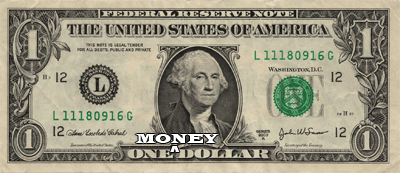
Known to all cash dollar.
This is a mistake, because there must be at least four currencies, and not one (cash dollars).
')
I offer the following notation:
The player makes the choice to buy or save the game based on how much each service “costs” (and not the product! ) In these four currencies, and also depending on the value of each of them for the player.
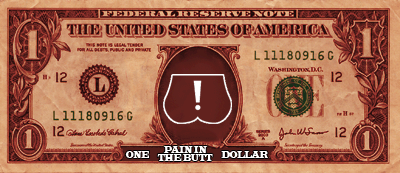
Dollars headache. I hate spending it.
In this article, cash dollars will be counted in US dollars, temporary dollars - in hours, headache dollars - in standard SI units "the amount of aspirin that I will have to take after an hour of beating my head against the wall." Honesty dollars can be measured in Ave Maria or in time spent on remorse.
Okay, I'm just kidding. It is obvious that $ G and $ H are the most subjective “currencies”, and it is difficult to evaluate them numerically, even in each individual case. But this does not make them any less real : I will show that the cost of services in $ G and $ H is sometimes the most important.
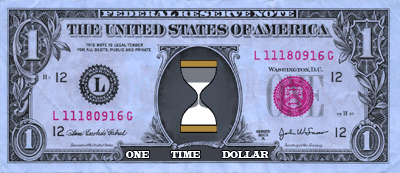
You have a limited supply of this currency, and you will never get more.
So let's start with my favorite example - Dragon Age II . After release, the game was worth:
This is an expensive game, installation and romp with interfering DRM took a lot of time and resembled interrogation with passion. The only cheap aspect of the game is that its purchase is the “right thing”, absolutely legal, so the guilt is not causing the player. The only parameter of this service that competes with a pirated copy is the value in dollars of honesty. For comparison, pirated sites "sold" the game at a much lower price:
It does not cost a penny of money, and time is spent only on downloading the game file. There is a slight headache, for example, a player may accidentally download a virus, he should know how to use bittorent (this is just for us, geeks, but not for the average person), and he is constantly overwhelmed with advertisements and pop-ups. Finally, there is a cost in honesty: piracy is illegal, and in it is “bad” from a moral point of view.
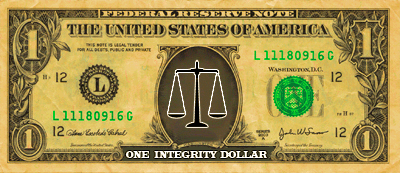
One dollar of honesty. We spend it in exchange for a piece of our soul.
And what if Dragon Age II had such a price?
For example, if the purchase of Dragon Age II was to enter payment information, download the game and start? Now the game looks quite competitive - less headache than when downloading a pirated version, zero value in terms of "morality", besides, the player does not violate the law!
The price of $ 60 will continue to scare away those who most value $ D for piracy, but now the game can attract those who value $ H, $ G and $ B more than $ D, and this is not such small group.
Again, I want to emphasize that the relative value of each currency for all players is different. People living in low-income countries will better spend more time ($ B) and get more headaches ($ D) if they know that they will get the game for $ 0D. Of all four, the cost of $ H is the most subjective, and depends on how important it is for the player (so to speak) to “do the right thing”, and on whether he sees the question of honesty at all in this choice.
Those who completely reject the value of the right to copy, most likely consider the value of $ H = 0. However, even in this case, the risk of probable problems with the law still raises $ H to a non-zero value.
The cost of $ H also depends on the behavior of the developer. The more friendly and “worthier” you look in the player’s eyes, the higher the cost in $ H with game piracy. The reverse is also true - a hostile attitude can easily reduce the cost of piracy in $ H and no one will suffer from remorse, spiraling the game with an imaginary "greedy and rich businessman."
In addition, there is a strong relationship between different currencies - the high cost of $ D reduces the cost of $ G in the player's eyes. If I pay at exorbitant prices, I expect first-class service. If, instead, they treat me like a criminal, then the cost of $ H piracy instantly collapses. Thank you very much, but I will give my temporary dollars and spend a little headache on your competitors.
We used this theory to create our own Defender's Quest sales strategy. Here is the current price of the game:
But what you offer on your favorite torrent site:
$ H depends on whether you feel more guilty in pirating games of indie developers than in pirating games of so-called “fat cats” like EA.
The developer can never compete with pirated sites only in price ($ D). Moreover, at best, you can only catch up with them in the cost of time ($ B), which takes only the search and download of the game.
Two areas in which you can compete and which are very different are the amount of headache and honesty. If you add DRM to the game, even if it has only 1% false positives, then you are raising $ G for these customers, and it becomes much higher than on pirated websites.
Throw away the DRM and provide a friendly and simple buying process, reducing by several times the cost of $ G, winning at this confusing torrent site.
In addition, as the author of the game, you offer the lowest cost of $ H. At best, you will even have a negative value of $ H, that is, buying a game inspires the player to respect yourself. The player feels that he “did the right thing”, he does not worry about breaking the law, and he gets a pleasant feeling of support from the creators of the game, which he liked.
Add - do not underestimate $ B and look for ways to reduce the time costs of the player. I received a lot of letters from the players: they said that the main reason for buying the game was a long demo from which it was possible to export the save file. Many wrote that they would not have bought the game if they had to start it from scratch. For such players, it’s not a problem to spend 7 days of dollars, but it’s unbearable to lose 2 temporary dollars that they have already spent on a demo.

"You can export the save file from the demo, import it into the full game, and continue playing." This tiny button reduces the time spent on the game in the demo.
That is my theory. It is not ideal, but it seems to me that it is much better than what most congressmen, company presidents and so-called economists can offer you.
It seems that the article caused a slight stir, so I will complement it.
I want to expand my original theory, and then check it out on several new examples to determine how comprehensive it is.
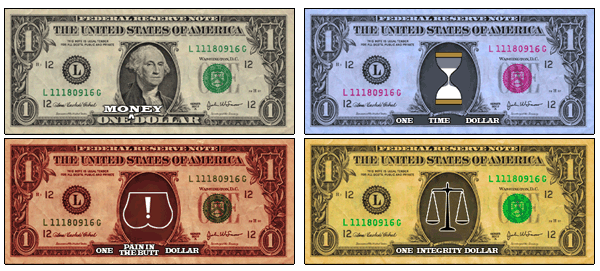
"Four currencies"
Task
The main objective of this article is to look at the discussion from a different angle. The old model (in which many senators and presidents of companies believed) naively associates the “cost” exclusively with cash dollars. However, this model poorly explains human behavior, because in addition to money, people are worried about other things - time, headache, honesty, and a million other aspects. Moreover, the value of each of these aspects for each has its own - including money! A model that takes into account these other, non-monetary “costs” explains better how and why people make their choice. This is what the whole theory of “four currencies” is about.
I chose these specific "four currencies" not because the list for them ends, but for the following reasons:
Thanks to a rather strong reaction to the article, I realized that the theory has a basis. I am an ordinary game developer and blogger, so I will leave the complex analyzes and scientific tests of the theory to graduate students who need a topic for a thesis.
The idea is still “new”, but I was not the first to put it forward. In this article for 2010, almost the same idea is proposed, expressed in slightly different words.
What I did not consider
In the first analysis, I missed some points that I will mention here.
What I did not say
Specifically, I did not mean that. I don’t think that we can (and should) use the formula $ D + $ B + $ G + $ H to measure or justify the “price tag” for aspects such as our time, inconvenience and honesty, or calculate some “conversion rates Between them, for example, between $ D and $ H. Even if there are any acceptable calculations, they are difficult to use, because the values are constantly changing, and it is difficult to compare the values of different people. And even if we take them into account, the original problem will remain - if we consider only these values, which we can simplify to numerical values, then we will miss all the other indefinite aspects that govern human behavior.

So, when we assign numeric values to these four currencies, they are inaccurate. The decision-making process is more like “shifting the scales” than converting “headache dollars” into “honesty dollars”.
What i want to say
This comic (source: TheOatmeal.com ) about a guy trying to watch the HBO series Game of Thrones is a good example of what I'm talking about. I will comment on some fragments showing the relative value in the four currencies of piracy and legitimate purchase, as the character perceives it.

“You know, and you're right. Already take a credit card and ready to buy it! iTunes, I'm coming! ”
As you can see, initially the cost of piracy in $ H is very high. Even though he can spirat and watch the show for free, he is determined to “do the right thing”. He even understands that it will take little time and effort to download the pirated version, but prefers to spend money for a quick and convenient buying process. It is not very clear how much he is willing to spend, but it seems that for him the value in cash dollars is lower than the satisfaction of a legitimate purchase.

- So, iTunes in flight.
- Try on Amazon.
- Also empty.
- What about Hulu Plus? You pay for this service, so the show will be there.
Unsuccessful attempts to buy content are annoying. On the scales of legitimate purchase is added the value of $ C and $ H. The perceived value of the pirated version remains unchanged. He tries to buy in iTunes, on Amazon and Hulu Plus, and then goes to the website of HBO itself:

“The site does not allow me to buy one series. It requires me to subscribe to their cable TV services, but I wander through websites because I have NO cable and DO NOT WANT to connect it. What to do?"
It turned out that the only way to legally gain access to the “Game of Thrones” is to enter into an agreement for cable services and subscribe to HBO. This is a huge headache, it is very expensive, and if you have to wait for the cablemaker, it will take a long time. $ G, $ D and $ B soar up to heaven. The cost of a legitimate purchase has become too high.
If it is fundamentally opposed to cable television, then the cost has increased in $ h.
At this point, he still rejects piracy, and this proves how highly he evaluates the value of $ H, that is, "illegal" or "dishonest" actions. He is still not sure what to do, but the scales are already ready to move in the other direction.

- Are you sure? Now, instead of the author, the money will go to some slippery advertisers. Besides, it is illegal and I do not believe it ... Wow, wow, how fast it loads. And so easy!
Hesitating, he decided to still spirat series, and surprised at how quick and simple the procedure. The cost of piracy in $ C and $ G sharply reduced, reflecting the new attitude of the character. Moreover, by this time it is so annoyed with the hellish level of the HBO service that the cost of piracy in $ H has also decreased (he no longer believes that this is very bad). The scale has gone down, and his choice is obvious: piracy.
It is worth noting that the consumer decided to save the content only at the very end of the process. If HBO had made any attempts to make access to this content user-friendly, then this person and others similar to it would have bought it. Instead, terrible service pushed him to piracy.
I do not condone piracy

I think at this point DRM advocates blame me for trying to “justify” piracy. I did not strive for anything like that. I make a living by creating games, so I believe that piracy is absolutely unfair, that is, the cost in $ H is almost endless for me.
However, this does not mean that I am happy to spend my $ D, $ V and $ G, requested by film studios and developers of AAA games - if I have a choice: to buy or buy, I prefer not to choose anything.
But most people do not look like me: sometimes the moment comes for them when $ G, $ B and $ D become more important than $ H, and they choose piracy. An example of this is given in the comic.
Some of these people may be our customers. Of course, not all - but some will prefer to buy our games, if we create a service that "costs" less. We can complain about pirates who “steal” our content and turn all our efforts to create cumbersome hardware, software and legal defenses in near-hopeless attempts to thwart them, or we can try to understand the motivation of their behavior and respond to it accordingly.
Piracy. It. Not. Theft.
By the way, for the record - piracy is not “theft”.
Piracy is the unauthorized access and copying of copyrighted material, such as a movie or video game.
Theft is the unauthorized receipt of objects, such as money, horses, or sandwiches, which deprives the rightful owner of the aforementioned object.
When you pirate Defender's Quest , you violate my legal right to monopolize the spread of the game for a limited period * of time. However, you do not “steal” the game, I still have copies of it, like all consumers who bought it. Piracy and theft are two different things.
* Once the right to copy was temporary, but nowadays it is almost forever.
More subtle nuances
I used the four currency model to show that DRM is bad, but quick-witted readers told me that in some cases my model actually justifies DRM. Let's look at a couple of examples.

Case # 1: Steam
First, let's take a look at Steam. DRM is used in Steam, but instead of annoying people and pushing them to piracy, it has created a huge dedicated player base.
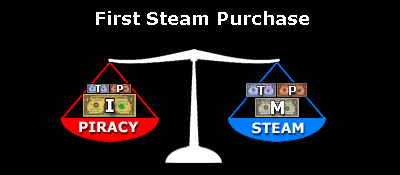
First purchase on Steam
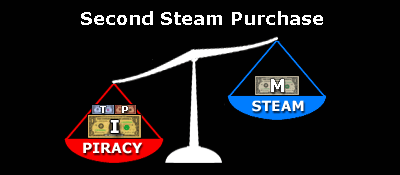
Second purchase on Steam
The model of four currencies explains this very well - to set up the Steam service, you need to spend quite a bit of $ G and $ C, the price is comparable to the first purchase on any other website. After that, each transaction is less than $ G and $ T. The account data is stored on the credit card, that is, your wallet is always open. The only difficulty is the first purchase.
Steam - is one of the rare cases where the "cost" for most players is determined only in $ D. Service Steam amazingly competes with free alternatives, and this demonstrates its success in Russia, which was considered a "pirate harbor."
A simple task is to convince the buyer to “open” the wallet and “pull out” a credit card from there - by itself it has a high value of $ G. Steam removed it from the buying process. This is the effect of "binding to Steam" - having overcome the first obstacle, it is logical to continue to acquire games on Steam.
EA Origin's rival service, whose DRM system is much more suppressive and restrictive, does not create a “bind to Steam” effect. He already has information about the customer’s credit card, but he doesn’t do anything to make the buying process more convenient, so there’s just as much on the second purchase.
Case # 2: Consoles
Another example is game consoles. Let's go back in 2001, in the era of PS2. The average user thinks to play Final Fantasy X and has nothing against piracy. Suppose it is limited in funds, and would gladly not pay $ 60. This is enough to push it to piracy, if it was only to download the torrent file. If Final Fantasy X were released on the PC, he would spin it in a second (or in a few hours, taking into account speeds in 2001).
However, this is not the case at all. FFX is only on PS2 and the user needs more than just downloading the game to run it on the console. He will have to burn a DVD from the uploaded ISO file (if he knows how). Then you need to reflash PS2 so that it can execute unsigned code.
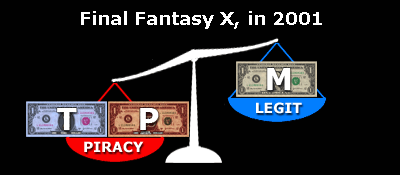
For a stranger to a regular user, this is all pretty scary, so he puts out 60 bucks and decides not to buy any more games this year. Although he does not feel guilty for piracy, it turned out to be easier to fork out.
* Of course, if there was a store selling PS2 and pirated discs nearby, it would be difficult to convince him to act according to the law.
The RIAA, MPAA, EA, Activision, and Congress seek this kind of anti-piracy strategy - they suspect that none of us have moral principles and remorse and believe that if they make piracy difficult , they will force people to act according to the law. In some cases, this model works. It works when consumers:
First, it is foolish to think that no one cares about $ H. It doesn’t really bother many, but in any case they always prefer piracy, so there is no reason to scare away honest users.
Secondly, technologies are gradually being improved, the download speed is growing, and more and more $ G and $ B are being transferred onto the shoulders of crackers, which then allow you to pirate content. The “good old time” of console games, which are difficult to save, is leaving.
Thirdly, the more the console goes to digital distribution, the more their problems with piracy resemble problems on the PC, where it becomes easier to pirate.
Fourth, quality of service is important . If I had a choice between selling our game on XBLA or on Steam, I would have chosen the Steam without thinking, only for sales reasons. Why does Steam sell so much if the PC market had to die? Because his service is better, and buyers love him for it.
And finally, even if DRM advocates ever win and invent something that makes piracy impossible , the buyer can always leave. Who needs video games if they have so much headache?

Known to all cash dollar.
This is a mistake, because there must be at least four currencies, and not one (cash dollars).
')
I offer the following notation:
- ($ D) Money Dollars
- ($ B) Temporary dollars
- ($ D) Headache Dollars [in the original "Pain-in-the-butt-dollars"]
- ($ W) Dollars of honesty
The player makes the choice to buy or save the game based on how much each service “costs” (and not the product! ) In these four currencies, and also depending on the value of each of them for the player.

Dollars headache. I hate spending it.
In this article, cash dollars will be counted in US dollars, temporary dollars - in hours, headache dollars - in standard SI units "the amount of aspirin that I will have to take after an hour of beating my head against the wall." Honesty dollars can be measured in Ave Maria or in time spent on remorse.
Okay, I'm just kidding. It is obvious that $ G and $ H are the most subjective “currencies”, and it is difficult to evaluate them numerically, even in each individual case. But this does not make them any less real : I will show that the cost of services in $ G and $ H is sometimes the most important.

You have a limited supply of this currency, and you will never get more.
So let's start with my favorite example - Dragon Age II . After release, the game was worth:
- $ D 60
- $ 5
- $ 100
- $ H 0
This is an expensive game, installation and romp with interfering DRM took a lot of time and resembled interrogation with passion. The only cheap aspect of the game is that its purchase is the “right thing”, absolutely legal, so the guilt is not causing the player. The only parameter of this service that competes with a pirated copy is the value in dollars of honesty. For comparison, pirated sites "sold" the game at a much lower price:
- $ D 0
- $ 0.5
- $ 5
- $ H 10
It does not cost a penny of money, and time is spent only on downloading the game file. There is a slight headache, for example, a player may accidentally download a virus, he should know how to use bittorent (this is just for us, geeks, but not for the average person), and he is constantly overwhelmed with advertisements and pop-ups. Finally, there is a cost in honesty: piracy is illegal, and in it is “bad” from a moral point of view.

One dollar of honesty. We spend it in exchange for a piece of our soul.
And what if Dragon Age II had such a price?
- $ D 60
- $ 0.5
- $ H 0.5
- $ H 0
For example, if the purchase of Dragon Age II was to enter payment information, download the game and start? Now the game looks quite competitive - less headache than when downloading a pirated version, zero value in terms of "morality", besides, the player does not violate the law!
The price of $ 60 will continue to scare away those who most value $ D for piracy, but now the game can attract those who value $ H, $ G and $ B more than $ D, and this is not such small group.
Again, I want to emphasize that the relative value of each currency for all players is different. People living in low-income countries will better spend more time ($ B) and get more headaches ($ D) if they know that they will get the game for $ 0D. Of all four, the cost of $ H is the most subjective, and depends on how important it is for the player (so to speak) to “do the right thing”, and on whether he sees the question of honesty at all in this choice.
Those who completely reject the value of the right to copy, most likely consider the value of $ H = 0. However, even in this case, the risk of probable problems with the law still raises $ H to a non-zero value.
The cost of $ H also depends on the behavior of the developer. The more friendly and “worthier” you look in the player’s eyes, the higher the cost in $ H with game piracy. The reverse is also true - a hostile attitude can easily reduce the cost of piracy in $ H and no one will suffer from remorse, spiraling the game with an imaginary "greedy and rich businessman."
In addition, there is a strong relationship between different currencies - the high cost of $ D reduces the cost of $ G in the player's eyes. If I pay at exorbitant prices, I expect first-class service. If, instead, they treat me like a criminal, then the cost of $ H piracy instantly collapses. Thank you very much, but I will give my temporary dollars and spend a little headache on your competitors.
We used this theory to create our own Defender's Quest sales strategy. Here is the current price of the game:
- $ D 5-7
- $ 0.08
- $ H 0.5
- $ H 0
But what you offer on your favorite torrent site:
- $ D 0
- $ 0.08
- $ 5
- $ H 10-20
$ H depends on whether you feel more guilty in pirating games of indie developers than in pirating games of so-called “fat cats” like EA.
The developer can never compete with pirated sites only in price ($ D). Moreover, at best, you can only catch up with them in the cost of time ($ B), which takes only the search and download of the game.
Two areas in which you can compete and which are very different are the amount of headache and honesty. If you add DRM to the game, even if it has only 1% false positives, then you are raising $ G for these customers, and it becomes much higher than on pirated websites.
Throw away the DRM and provide a friendly and simple buying process, reducing by several times the cost of $ G, winning at this confusing torrent site.
In addition, as the author of the game, you offer the lowest cost of $ H. At best, you will even have a negative value of $ H, that is, buying a game inspires the player to respect yourself. The player feels that he “did the right thing”, he does not worry about breaking the law, and he gets a pleasant feeling of support from the creators of the game, which he liked.
Add - do not underestimate $ B and look for ways to reduce the time costs of the player. I received a lot of letters from the players: they said that the main reason for buying the game was a long demo from which it was possible to export the save file. Many wrote that they would not have bought the game if they had to start it from scratch. For such players, it’s not a problem to spend 7 days of dollars, but it’s unbearable to lose 2 temporary dollars that they have already spent on a demo.

"You can export the save file from the demo, import it into the full game, and continue playing." This tiny button reduces the time spent on the game in the demo.
That is my theory. It is not ideal, but it seems to me that it is much better than what most congressmen, company presidents and so-called economists can offer you.
Continuation
It seems that the article caused a slight stir, so I will complement it.
I want to expand my original theory, and then check it out on several new examples to determine how comprehensive it is.

"Four currencies"
Task
The main objective of this article is to look at the discussion from a different angle. The old model (in which many senators and presidents of companies believed) naively associates the “cost” exclusively with cash dollars. However, this model poorly explains human behavior, because in addition to money, people are worried about other things - time, headache, honesty, and a million other aspects. Moreover, the value of each of these aspects for each has its own - including money! A model that takes into account these other, non-monetary “costs” explains better how and why people make their choice. This is what the whole theory of “four currencies” is about.
I chose these specific "four currencies" not because the list for them ends, but for the following reasons:
- These are the main aspects that I consider when shopping
- "Four currencies" is a memorable expression
- They allow you to quickly understand the essence
Thanks to a rather strong reaction to the article, I realized that the theory has a basis. I am an ordinary game developer and blogger, so I will leave the complex analyzes and scientific tests of the theory to graduate students who need a topic for a thesis.
The idea is still “new”, but I was not the first to put it forward. In this article for 2010, almost the same idea is proposed, expressed in slightly different words.
What I did not consider
In the first analysis, I missed some points that I will mention here.
- VALUE of the product. In all my comparisons it is assumed that the products have the same value. This is not always the case - for example, a pirated version of the game may contain viruses, a purchase on Steam has additional value due to the possibilities of integration with Steam, etc. Although poor quality can be considered an additional cost of $ G, it is somewhat confusing.
- Whose costs? When discussing the “cost” of DRM, I did not explain who pays “headache” and “time”. For example, $ V and $ G are very high for crackers cracking DRM. Without this, DRM is insurmountable for non-technical users, so initially the cost of $ G piracy for them is very high. As soon as a hacked version appears on pirate sites, the cost of $ G / $ V for all decreases. I can write a whole article on this topic, so for simplicity, most of my examples in this article will relate only to the “cost” for the user.
- Values are DYNAMIC. Many wrote that I consider the cost "static", that is, unchanged. Obviously, they misunderstood me, so I’ll clarify that the value of each of the “four currencies” is dynamic and changes over time, different for different people, and even for one person.
- Value is relative. The actual amount of expenses is less important than the subjective value for a particular person. For example, 60 cash dollars have different values for the rich and the poor. At a rate of $ 5 per hour, this is more than the daily wage, and at $ 240 per hour - just 15 minutes of work. And when converting money into temporary dollars, we still get relative values, because everyone values time differently. That is, even the most “objective” and “measurable” values, for example, $ D and $ B, still have subjective value. Naturally, $ G and $ H are still more difficult to measure.
- Your experience may be different. I give values in four currencies as I value them , or else I would have to describe the values of a fictional person. Most likely, for you the importance of different currencies will be different.
What I did not say
Specifically, I did not mean that. I don’t think that we can (and should) use the formula $ D + $ B + $ G + $ H to measure or justify the “price tag” for aspects such as our time, inconvenience and honesty, or calculate some “conversion rates Between them, for example, between $ D and $ H. Even if there are any acceptable calculations, they are difficult to use, because the values are constantly changing, and it is difficult to compare the values of different people. And even if we take them into account, the original problem will remain - if we consider only these values, which we can simplify to numerical values, then we will miss all the other indefinite aspects that govern human behavior.

So, when we assign numeric values to these four currencies, they are inaccurate. The decision-making process is more like “shifting the scales” than converting “headache dollars” into “honesty dollars”.
What i want to say
This comic (source: TheOatmeal.com ) about a guy trying to watch the HBO series Game of Thrones is a good example of what I'm talking about. I will comment on some fragments showing the relative value in the four currencies of piracy and legitimate purchase, as the character perceives it.

“You know, and you're right. Already take a credit card and ready to buy it! iTunes, I'm coming! ”
As you can see, initially the cost of piracy in $ H is very high. Even though he can spirat and watch the show for free, he is determined to “do the right thing”. He even understands that it will take little time and effort to download the pirated version, but prefers to spend money for a quick and convenient buying process. It is not very clear how much he is willing to spend, but it seems that for him the value in cash dollars is lower than the satisfaction of a legitimate purchase.

- So, iTunes in flight.
- Try on Amazon.
- Also empty.
- What about Hulu Plus? You pay for this service, so the show will be there.
Unsuccessful attempts to buy content are annoying. On the scales of legitimate purchase is added the value of $ C and $ H. The perceived value of the pirated version remains unchanged. He tries to buy in iTunes, on Amazon and Hulu Plus, and then goes to the website of HBO itself:

“The site does not allow me to buy one series. It requires me to subscribe to their cable TV services, but I wander through websites because I have NO cable and DO NOT WANT to connect it. What to do?"
It turned out that the only way to legally gain access to the “Game of Thrones” is to enter into an agreement for cable services and subscribe to HBO. This is a huge headache, it is very expensive, and if you have to wait for the cablemaker, it will take a long time. $ G, $ D and $ B soar up to heaven. The cost of a legitimate purchase has become too high.
If it is fundamentally opposed to cable television, then the cost has increased in $ h.
At this point, he still rejects piracy, and this proves how highly he evaluates the value of $ H, that is, "illegal" or "dishonest" actions. He is still not sure what to do, but the scales are already ready to move in the other direction.

- Are you sure? Now, instead of the author, the money will go to some slippery advertisers. Besides, it is illegal and I do not believe it ... Wow, wow, how fast it loads. And so easy!
Hesitating, he decided to still spirat series, and surprised at how quick and simple the procedure. The cost of piracy in $ C and $ G sharply reduced, reflecting the new attitude of the character. Moreover, by this time it is so annoyed with the hellish level of the HBO service that the cost of piracy in $ H has also decreased (he no longer believes that this is very bad). The scale has gone down, and his choice is obvious: piracy.
It is worth noting that the consumer decided to save the content only at the very end of the process. If HBO had made any attempts to make access to this content user-friendly, then this person and others similar to it would have bought it. Instead, terrible service pushed him to piracy.
I do not condone piracy

I think at this point DRM advocates blame me for trying to “justify” piracy. I did not strive for anything like that. I make a living by creating games, so I believe that piracy is absolutely unfair, that is, the cost in $ H is almost endless for me.
However, this does not mean that I am happy to spend my $ D, $ V and $ G, requested by film studios and developers of AAA games - if I have a choice: to buy or buy, I prefer not to choose anything.
But most people do not look like me: sometimes the moment comes for them when $ G, $ B and $ D become more important than $ H, and they choose piracy. An example of this is given in the comic.
Some of these people may be our customers. Of course, not all - but some will prefer to buy our games, if we create a service that "costs" less. We can complain about pirates who “steal” our content and turn all our efforts to create cumbersome hardware, software and legal defenses in near-hopeless attempts to thwart them, or we can try to understand the motivation of their behavior and respond to it accordingly.
Piracy. It. Not. Theft.
By the way, for the record - piracy is not “theft”.
Piracy is the unauthorized access and copying of copyrighted material, such as a movie or video game.
Theft is the unauthorized receipt of objects, such as money, horses, or sandwiches, which deprives the rightful owner of the aforementioned object.
When you pirate Defender's Quest , you violate my legal right to monopolize the spread of the game for a limited period * of time. However, you do not “steal” the game, I still have copies of it, like all consumers who bought it. Piracy and theft are two different things.
* Once the right to copy was temporary, but nowadays it is almost forever.
More subtle nuances
I used the four currency model to show that DRM is bad, but quick-witted readers told me that in some cases my model actually justifies DRM. Let's look at a couple of examples.

Case # 1: Steam
First, let's take a look at Steam. DRM is used in Steam, but instead of annoying people and pushing them to piracy, it has created a huge dedicated player base.

First purchase on Steam

Second purchase on Steam
The model of four currencies explains this very well - to set up the Steam service, you need to spend quite a bit of $ G and $ C, the price is comparable to the first purchase on any other website. After that, each transaction is less than $ G and $ T. The account data is stored on the credit card, that is, your wallet is always open. The only difficulty is the first purchase.
Steam - is one of the rare cases where the "cost" for most players is determined only in $ D. Service Steam amazingly competes with free alternatives, and this demonstrates its success in Russia, which was considered a "pirate harbor."
A simple task is to convince the buyer to “open” the wallet and “pull out” a credit card from there - by itself it has a high value of $ G. Steam removed it from the buying process. This is the effect of "binding to Steam" - having overcome the first obstacle, it is logical to continue to acquire games on Steam.
EA Origin's rival service, whose DRM system is much more suppressive and restrictive, does not create a “bind to Steam” effect. He already has information about the customer’s credit card, but he doesn’t do anything to make the buying process more convenient, so there’s just as much on the second purchase.
Case # 2: Consoles
Another example is game consoles. Let's go back in 2001, in the era of PS2. The average user thinks to play Final Fantasy X and has nothing against piracy. Suppose it is limited in funds, and would gladly not pay $ 60. This is enough to push it to piracy, if it was only to download the torrent file. If Final Fantasy X were released on the PC, he would spin it in a second (or in a few hours, taking into account speeds in 2001).
However, this is not the case at all. FFX is only on PS2 and the user needs more than just downloading the game to run it on the console. He will have to burn a DVD from the uploaded ISO file (if he knows how). Then you need to reflash PS2 so that it can execute unsigned code.

For a stranger to a regular user, this is all pretty scary, so he puts out 60 bucks and decides not to buy any more games this year. Although he does not feel guilty for piracy, it turned out to be easier to fork out.
* Of course, if there was a store selling PS2 and pirated discs nearby, it would be difficult to convince him to act according to the law.
The RIAA, MPAA, EA, Activision, and Congress seek this kind of anti-piracy strategy - they suspect that none of us have moral principles and remorse and believe that if they make piracy difficult , they will force people to act according to the law. In some cases, this model works. It works when consumers:
- Little value $ h
- Can't get around DRM easily
- Do not stop playing games, even when they are badly treated
First, it is foolish to think that no one cares about $ H. It doesn’t really bother many, but in any case they always prefer piracy, so there is no reason to scare away honest users.
Secondly, technologies are gradually being improved, the download speed is growing, and more and more $ G and $ B are being transferred onto the shoulders of crackers, which then allow you to pirate content. The “good old time” of console games, which are difficult to save, is leaving.
Thirdly, the more the console goes to digital distribution, the more their problems with piracy resemble problems on the PC, where it becomes easier to pirate.
Fourth, quality of service is important . If I had a choice between selling our game on XBLA or on Steam, I would have chosen the Steam without thinking, only for sales reasons. Why does Steam sell so much if the PC market had to die? Because his service is better, and buyers love him for it.
And finally, even if DRM advocates ever win and invent something that makes piracy impossible , the buyer can always leave. Who needs video games if they have so much headache?
Source: https://habr.com/ru/post/334020/
All Articles